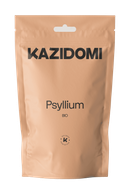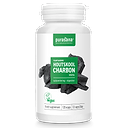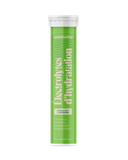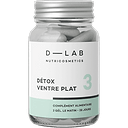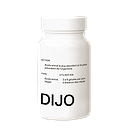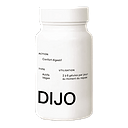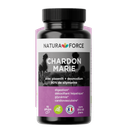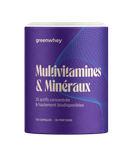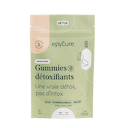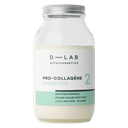Summer is often a time to slow down, take care of yourself, and reconnect with your well-being. But it's hard to fully enjoy it when you feel bloated, your stomach is swollen, or your legs feel heavy due to water retention.
No guilt-tripping here. The goal isn’t to lose weight at all costs, but to help you relieve digestive discomforts, support drainage, and naturally regain a flat tummy. With the right diet, a few simple tips, and the support of targeted plants and supplements, you can enjoy a lighter, more comfortable summer — without bloating or heaviness.
Understand the causes of bloating and water retention
Bloating is often a sign of a disrupted digestive system. It may be caused by slow digestion, an excess of pro-inflammatory foods, an imbalance in gut microbiota, or food intolerances (like lactose or gluten). Fermentation of certain foods in the colon produces gas, which leads to a feeling of fullness and sometimes even pain.
Water retention typically causes swelling in the limbs (feet, ankles, hands), a sensation of heaviness, and can worsen the appearance of cellulite. It often results from a lack of physical activity, high salt intake, circulatory issues, or hormonal imbalances.
These two symptoms are frequently connected. If your digestion is sluggish, the discomfort spreads — you feel “full,” sometimes even upon waking. That’s why it’s essential to support your gut, bowel transit, and lymphatic system.
Eat foods that support digestion
A diet rich in soluble fiber, low-irritation foods, and natural ferments is key to a calm and comfortable belly. When you’re bloated, the goal isn’t to eat less — it’s to make smarter food choices.
Focus on:
- lightly steamed vegetables (zucchini, carrots, spinach): more digestible, rich in gentle fiber and water;
- enzyme-rich fruits (kiwi, papaya, pineapple): help break down proteins and reduce fermentation;
- complex, gut-friendly carbs like rolled oats, brown basmati rice, or buckwheat: nourishing and easy to digest;
- natural probiotics (kefir, plain yogurt, raw sauerkraut): start with small amounts — don’t add them all at once.
Also, add a pinch of cumin, ground fennel, or grated ginger to your meals to boost digestion. These spices are carminative — they help reduce gas formation in the gut.
And above all, don’t underestimate the power of chewing. Eat slowly, mindfully, without screens, and take time to chew each bite well. Proper chewing kickstarts digestion in the mouth, reduces intestinal pressure, and naturally helps minimize bloating.
Avoid foods that inflame and ferment
When you're feeling bloated, it’s best to take a break from certain inflammatory, irritating, or fermentable foods that can upset your digestive system:
- improperly soaked or undercooked legumes (lentils, chickpeas, dried beans),
- dairy products high in lactose (cow’s milk, fresh cheeses),
- gluten-containing grains if you're sensitive (wheat, rye, barley),
- ultra-processed foods, refined sugars, industrial ready meals,
- fizzy drinks, chewing gum, and sugar substitutes like sorbitol or xylitol.
If you want to reintroduce legumes, soak them for 12 hours with a pinch of baking soda, then rinse thoroughly and cook them slowly with a bay leaf or a piece of kombu seaweed to make them easier to digest.
Your gut is talking — listen and adjust
Everyone’s digestive tolerance is different. You might digest a raw veggie salad just fine but feel bloated after one slice of white bread — or the other way around. That’s where body awareness becomes essential.
Start by:
- keeping a food journal for a few days: write down what you eat, but especially how you feel after each meal,
- identifying trigger foods (those that cause bloating, gas, heaviness, or sluggish transit),
- removing them temporarily, then reintroducing them one at a time in small amounts to see what you truly tolerate.
If digestive issues are frequent, they may point to intestinal permeability, dysbiosis, or microbiota imbalance. In such cases, a course of probiotics, L-glutamine, or working with a professional can help you restore gut harmony in the long term.
Drink to support elimination
Water retention can be misleading: you feel bloated, so you drink less — when in fact you should be doing the opposite. When your body lacks water, it goes into survival mode and starts storing what it gets. The result: swelling, heavy legs, a tight belly, and sometimes more visible cellulite. To get things moving again, you need to hydrate properly and consistently.
Hydrate with quality and quantity
Aim for 1.5 to 2 liters per day, outside of meals, spread out over the day. Don’t drink it all at once — that could stress your kidneys or upset your stomach.
Alternate between:
- low-mineral water for gentle drainage (like Mont Roucous, Rosée de la Reine…),
- digestive and draining herbal teas: fennel (anti-bloating), ginger (stimulates digestion), chamomile (soothes cramps and relaxes the belly),
- homemade infused waters, easy to prep: water + slices of lemon, cucumber, and fresh mint leaves — refreshing and kidney-stimulating.
A great way to start your day is with a glass of warm lemon water on an empty stomach. It jumpstarts digestion, gently supports liver detox, and promotes toxin elimination first thing in the morning.
Avoid drinks that disrupt...
Some drinks can slow digestion or increase water retention — despite appearances:
- Sodas (even diet ones), which irritate the digestive lining and often cause bloating
- Alcoholic beverages, which dehydrate the body and impair elimination
- Excess caffeine, which may stimulate short-term but disrupt water balance
- Industrial fruit juices, which are too sugary and low in fiber
If you struggle to drink plain water, try natural coconut water (unsweetened) for a light remineralizing effect, or simply add a few drops of orange blossom water or fresh grated ginger to your bottle.
Move to boost circulation and transit
Physical activity does more than burn calories: it stimulates your circulatory, lymphatic, and digestive systems — the same systems that help reduce water retention, ease bloating, and improve skin tone.
Exercise boosts venous return, promotes lymphatic drainage (which helps eliminate water trapped in tissues), and speeds up intestinal transit — often slowed by a sedentary lifestyle or stress.
Choose gentle but consistent movement
No need for high-intensity workouts to see results — regularity is what matters:
- Walk 30 minutes a day, at a brisk pace, ideally in the morning or after meals — this improves digestion and tissue oxygenation.
- Try digestive yoga or Pilates — twists, stretches, and folds stimulate digestive organs and support gentle transit.
- Take the stairs, ride a bike, swim, or dance — anything that gets your legs and core moving helps support natural drainage.
Boost circulation with targeted habits
To complement physical activity, these simple practices can enhance your lymphatic flow:
- Dry brushing every morning on dry skin, from bottom to top, with a soft natural brush
- Self-massage with light circular motions on legs, hips, and belly to encourage lymphatic drainage
- Contrast showers: finish your shower with cold water on your legs to tone blood vessels and stimulate microcirculation
- Elevate your legs for a few minutes daily — especially if you spend long periods sitting or standing
Bonus tip: Avoid tight clothing, especially around the waist and thighs, which can hinder circulation.
Add targeted natural supplements
While food, hydration, and movement are the foundations of a flat stomach and light legs, certain natural supplements can enhance your efforts. Used as supportive short-term cures, they help relieve digestive troubles, activate elimination, and reduce swelling. These aren't miracle solutions — but integrated into a holistic routine, they can speed up results and offer real relief.
Support digestion and microbiota
- Probiotics: strengthen gut flora, reduce chronic bloating, and improve transit. Choose a multi-strain formula with at least 5 to 10 billion CFUs, taken on an empty stomach in the morning.
- Activated charcoal: a powerful absorbent that captures intestinal gas and soothes flatulence. Use occasionally after heavy meals or during intense bloating. Take away from medications or other supplements, as it may reduce their absorption.
- For persistent digestive issues, consider a course of L-glutamine or curcumin to strengthen the intestinal lining and reduce inflammation.
Drain gently to ease retention
- Dandelion, meadowsweet, orthosiphon: gentle diuretics that support kidney function and reduce water retention. Ideal in 3-week courses.
- Ash tree, cherry stem, birch: commonly found in draining blends, they support lymphatic circulation and relieve heavy legs.
- Blackcurrant: both anti-inflammatory and draining, perfect for hormonal or cyclical water retention.
Liquid forms (vials or fresh plant extracts) are often more concentrated and better absorbed. Dilute in 1 liter of water and sip throughout the day to maximize the draining effect.
Ease daily bloating
Fennel, ginger, dill, caraway: carminative plants that relieve digestive spasms, reduce gas, and ease digestion. Available in capsule, tea, or essential oil form (use with caution).
Before starting any supplement regimen, always consult your doctor or a qualified health professional — especially if you're under medical treatment, have digestive or kidney issues, or are pregnant or breastfeeding. Supplements can be powerful allies, as long as they’re well chosen, properly used, and part of a personalized wellness approach.
Conclusion: A lighter summer starts on your plate
By adopting the right diet, staying hydrated, moving your body a little, and using a few natural tips, you can reduce digestive and circulatory discomforts.
No need to follow a strict diet — the idea is to listen to your body, support it with well-chosen foods, and build simple yet effective habits into your routine. Less bloating, more comfort… and a real sense of lightness as summer approaches.
FAQ – Your most common questions
1. What’s the difference between bloating and weight gain? Bloating is temporary, digestion-related, and often comes with gas or abdominal discomfort. Weight gain is gradual and doesn’t fluctuate throughout the day.
2. Which foods help relieve bloating quickly? Fennel, ginger, low-FODMAP fruits like kiwi, and soluble fiber can help flatten the belly quickly.
3. How do I know if my gut microbiota is imbalanced? Frequent bloating, gas, unexplained fatigue, or recurring infections may be signs. A probiotic course can help restore balance.
4. Which natural supplements help with water retention? Opt for draining plants like meadowsweet, cherry stem, orthosiphon, or dandelion. They help flush out excess water.
5. Can I do lymphatic drainage on my own? Yes — through daily dry brushing or self-massage of the legs, belly, and arms. These help stimulate your lymphatic system.
6. Can fiber make digestive issues worse? Yes, if consumed in excess or the wrong type. Choose soluble fiber (like oats or cooked apples) over harsh fibers (like undercooked legumes or wheat bran).
7. How are stress and digestion connected? Chronic stress slows digestion, disrupts gut flora, and promotes bloating. Breathing, relaxation, and mindful pauses are key.
8. How can I manage digestive issues while on vacation? Pack probiotics and activated charcoal, avoid heavy or spicy meals, stay hydrated, and walk regularly.
9. Do I need to cut gluten to feel less bloated? Only if you’re sensitive or intolerant. Otherwise, just limit excesses and opt for easily digestible whole grains.
10. What if I have frequent abdominal pain? Consult a doctor to rule out digestive conditions (like IBS or gastroenteritis) and adjust your diet accordingly.


